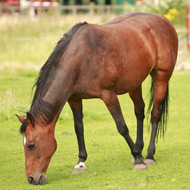Equines in "urgent need of protection"

A research project will be launched to assess equine welfare in Europe.
Equine charities have welcomed a move by the European Commission to hold the first ever equine experts event in Brussels.
The meeting on May 7 will gather experts from across European member states to discuss equine welfare and regulation.
Andrea Gavinelli, head of the animal welfare unit, DG SANCO, said: "Whilst equine animals on farms have the same level of protection as any other farmed animal the European Commission recognises that there are gaps in the welfare legislation when they are considered as companion animals.
"We need to consider what impact this has had and how to respond. This expert meeting is the very first step in this process."
World Horse Welfare chief executive Roly Owers said: "Across Europe we see equines falling in between the cracks of laws designed to protect farm animals and pets.
"This is in part because equines are uniquely versatile animals which can play so many different roles during their lives, from working animal, to sport animal, to pet, to food source."
As a result, he says equines are facing a number of health and welfare challenges, which may in turn affect human health.
"We now have an excellent opportunity to identify what existing welfare legislation is operating in member states, where the gaps are, where existing industry practices are working well and where additional legislation would benefit the industry,” he added.
At the meeting this month, World Horse Welfare and Eurogroup for Animals will launch a research project on equine welfare across Europe.
Reineke Hameleers, director of Eurogroup for Animals, explained: "Although Europe has experienced an economic downturn, the equine sector continues to grow and as equines are one of the most frequently traded and transported animals in Europe they are in urgent need of protection."
A report will be published on the research by the end of 2014. It will make recommendations on equine welfare and if necessary legislation.



 The Federation of Independent Veterinary Practices (FIVP) has announced a third season of its podcast, Practice Matters.
The Federation of Independent Veterinary Practices (FIVP) has announced a third season of its podcast, Practice Matters.